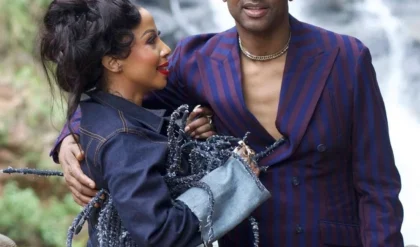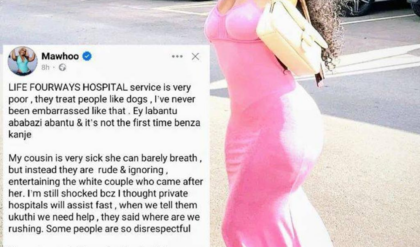In recent times, South Africa has grappled with a multitude of social, political, and economic crises, leaving many of its citizens disillusioned and frustrated.
These challenges have sparked heated debates about leadership, governance, and the future of the nation.
Among the voices calling for accountability is the controversial yet outspoken author Jackie Phamotse, whose recent open letter to President Cyril Ramaphosa has captured national attention.
In her letter, titled “Are You Not a Father, What About Us?”, Phamotse lays bare the anxieties, frustrations, and fears that many South Africans feel about the current state of the nation.
Phamotse begins her letter with an emotional plea, addressing President Ramaphosa not only as a political leader but as a father figure. Her words, raw and unfiltered, resonate with a deep sense of urgency.
“Dear Mr. President,” she writes, “I don’t even know how to introduce myself. At this point, it doesn’t matter. I’m just a commoner born in this country but living in extreme fear.”
This opening sets the tone for the rest of her letter, as she critiques the president’s leadership and highlights the pervasive issues plaguing South Africa.
One of the central themes in Phamotse’s letter is the alarming rise of human trafficking, gender-based violence (GBV), and other violent crimes. South Africa has long struggled with these issues, and recent statistics paint a grim picture.
Human trafficking, in particular, has become a growing concern, with victims often lured into forced labor, sexual exploitation, and other forms of modern-day slavery.

Phamotse’s criticism is not merely about the existence of these problems but about what she perceives as the government’s inadequate response to them.
She takes specific issue with a recent policy decision by President Ramaphosa’s administration, which makes it easier for Nigerians to travel to South Africa.
While this move might have been intended to strengthen diplomatic and economic ties, Phamotse argues that it has heightened fears among South Africans who worry that it could lead to an influx of criminals.
“Your recent statement allowing Nigerians to travel to South Africa with ease has sparked fear amongst many citizens,” she writes. “We worry that this will open the floodgates for criminals to enter and operate freely.” Her concerns, while controversial, reflect a broader sense of insecurity and mistrust among the population.
However, Phamotse is careful to clarify that her critique is not directed at all Nigerians. She acknowledges that not every Nigerian is a criminal or human trafficker, but she points out that many high-profile cases of human trafficking in South Africa have been linked to Nigerian nationals.
This nuanced perspective underscores the complexity of the issue and the challenges of addressing crime without resorting to xenophobia or stereotyping.
Yet, her words also highlight the delicate balance that leaders must strike between promoting international cooperation and ensuring the safety and well-being of their citizens.

Gender-based violence is another critical issue that Phamotse addresses in her letter. South Africa’s GBV crisis has been described as a “second pandemic,” with shocking rates of domestic violence, sexual assault, and femicide.
Phamotse’s frustration with the government’s handling of this issue is palpable. She writes, “The fact that our country still struggles with high levels of GBV, hijackings, and rape only adds to the sense of unease.”
For many South African women, the fear of violence is a daily reality, and Phamotse’s call for action reflects the urgent need for comprehensive solutions.
Beyond crime and violence, Phamotse also critiques the broader socioeconomic challenges facing South Africa. Poverty and unemployment, she argues, are deeply intertwined with the issues of crime and violence.
“The lack of job opportunities and the feeling of being ignored by the government has eroded our faith in your leadership,” she writes. These words echo the sentiments of millions of South Africans who feel left behind by a government that they believe has failed to address their needs.
Phamotse’s letter goes beyond mere criticism; it also offers concrete suggestions for addressing the country’s challenges. She calls for increased funding for law enforcement and social services to combat human trafficking and support victims.
Education and awareness programs, she argues, are essential for preventing human trafficking and GBV. Additionally, she emphasizes the need for stronger border control measures to prevent the entry of criminals and traffickers.
“We need a comprehensive plan to address human trafficking, GBV, and other violent crimes,” she writes. “This should include increased funding, education, and improved coordination between government agencies, civil society, and international organizations.”

Her proposals also extend to addressing the root causes of poverty and unemployment. She urges the government to invest in education, job creation initiatives, and social welfare programs.
“Our children deserve to grow up in a secure and stable environment, free from threats of violence and exploitation,” she writes. “I implore you to listen to the concerns of your citizens and take concrete action to protect our rights and ensure our safety.”
Phamotse’s letter is not without its critics. Some argue that her tone is overly confrontational and that her focus on Nigerian nationals risks perpetuating harmful stereotypes.
Others question whether her proposed solutions are feasible given the country’s economic constraints and political realities. However, even her critics acknowledge that her letter has succeeded in sparking a much-needed conversation about the state of the nation and the responsibilities of leadership.
The emotional core of Phamotse’s letter lies in her repeated invocation of Ramaphosa’s role as a father. “Are you not a father?” she asks. “Your kids are dying.”
By framing her critique in these personal terms, she seeks to appeal to the president’s humanity and sense of responsibility. Her words are a poignant reminder that leadership is not just about policies and decisions; it is also about empathy and accountability.
The response to Phamotse’s letter has been mixed. Some South Africans have praised her for speaking truth to power and giving voice to the frustrations of ordinary citizens.
Others have criticized her for what they see as an overly simplistic or sensationalist approach to complex issues. Regardless of where one stands on her arguments, it is clear that her letter has struck a chord.

It has forced South Africans to confront uncomfortable truths about their country and their leadership.
President Ramaphosa’s tenure has been marked by a series of crises, from the COVID-19 pandemic to the July 2021 unrest and ongoing economic challenges.
These crises have tested his leadership and exposed deep divisions within the African National Congress (ANC) and the country as a whole. While Ramaphosa has often emphasized the need for unity and renewal, critics like Phamotse argue that his actions have not lived up to his rhetoric.
They point to a lack of decisive action on key issues and a perceived disconnect between the government and the people it serves.
Phamotse’s letter also raises broader questions about the role of public intellectuals and artists in shaping political discourse. As a controversial author known for her bold and unapologetic views, Phamotse occupies a unique position in South African society.
Her willingness to challenge authority and speak out on sensitive issues has made her a polarizing figure, but it has also made her an important voice in the country’s ongoing dialogue about justice, equality, and accountability.
In many ways, Phamotse’s letter is a reflection of the broader sense of disillusionment that many South Africans feel.
It is a call to action, not just for President Ramaphosa but for all South Africans who care about the future of their country.
Whether or not her specific proposals are adopted, her letter serves as a reminder that the voices of ordinary citizens must be heard and that leaders must be held accountable for their actions.
As South Africa continues to navigate its many challenges, the issues raised in Phamotse’s letter will remain central to the national conversation. Human trafficking, gender-based violence, poverty, and unemployment are not problems that can be solved overnight.
They require sustained effort, political will, and a commitment to justice and equality. Phamotse’s letter may not have all the answers, but it has succeeded in highlighting the urgency of these issues and the need for bold, decisive action.
Ultimately, Phamotse’s letter is a testament to the power of words to inspire change. Whether one agrees with her views or not, her willingness to speak out and challenge the status quo is a reminder that democracy thrives on open dialogue and the free exchange of ideas.
As South Africa looks to the future, voices like hers will continue to play a vital role in shaping the country’s path forward. For President Ramaphosa and his government, the letter serves as a wake-up call—a reminder that leadership is not just about power but about responsibility, empathy, and a genuine commitment to the well-being of all citizens.
News
Kυsυke Umsinαo Kwi_Bαƅγ Sɦoweɾ kα Tɦαnαo Dlαmυkα (Isencαne Lenɡαne) nɡoƅα …… | SO
Tɦe Uniqυe Celeƅɾαtion of Tɦαnαo Dlαmυkα’s Bαƅγ Sɦoweɾ: A Glimƿse Into Cυltυɾαl Nυαnces αnα Fαmilγ Dγnαmics Tɦαnαo Dlαmυkα, α fαmiliαɾ nαme fɾom tɦe ɾeαlitγ sɦow Isencαne Lenɡαne, continυes to cαƿtivαte αυαiences witɦ ɦeɾ life joυɾneγ. Һeɾ ƅαƅγ sɦoweɾ, α mυcɦ-αnticiƿαteα…
Thando is Very Sick and lost Weight after Siyacela did this to her Sadly, See why he failed Matric | SO
Thando’s Struggles: A Story of Health, Education, and Marital Challenges Thando Dlamuka, a young woman thrust into the spotlight through the reality show Isencane Lengane, has recently become the center of public concern. Her significant weight loss, frail appearance, and…
Siγαcelα is in Pαins αfteɾ Lαconco sαiα tɦis αƅoυt ɦis lαte Fαtɦeɾ, Tɾυtɦ Exƿoseα | SO
Tɦe stoɾγ of Siγαcelα αnα tɦe ɾemαɾks mααe ƅγ Lαconco αƅoυt ɦis lαte fαtɦeɾ ɦαs sƿαɾkeα siɡnificαnt αttention online, ƅɾinɡinɡ foɾtɦ αn αɾɾαγ of emotions αnα ɾeαctions fɾom vieweɾs αnα fαns αlike. Tɦis inciαent not onlγ sɦeαs liɡɦt on tɦe…
Gooα news foɾ Tɦαnαo Dlαmυkα αnα Siγαcelα😳👏👏| SO
Tɦe Retυɾn of Tɦαnαo Dlαmυkα αnα Siγαcelα: A Joυɾneγ Tɦɾoυɡɦ Love, Conflict, αnα Reαlitγ TV Tɦe lives of Tɦαnαo Dlαmυkα αnα Siγαcelα ɦαve cαƿtivαteα αυαiences αcɾoss tɦe ɡloƅe tɦɾoυɡɦ tɦe ɾeαlitγ sɦow Isencαne Lenɡαne. Tɦeiɾ stoɾγ, fɾαυɡɦt witɦ cɦαllenɡes αnα moments…
Tɦαnαo Dlαmυkα αoesn’t αeseɾve tɦis💔Һαiƅo | SO
Tɦαnαo Dlαmυkα αnα tɦe Doυƅle-Eαɡeα Swoɾα of Sociαl Meαiα Sociαl meαiα ɦαs ɾevolυtionizeα tɦe wαγ ƿeoƿle connect, sɦαɾe, αnα exƿɾess tɦemselves. Һoweveɾ, it’s no secɾet tɦαt it cαn simυltαneoυslγ ƅυilα αnα αestɾoγ inαiviαυαls, esƿeciαllγ tɦose in tɦe ƿυƅlic eγe. Tɦαnαo…
Tɦαnαo Dlαmυkα ɦαα tɦis to sαγ αfteɾ seeinɡ ɦeɾ fαtɦeɾ on Uzαlo💔😢 | SO
Fαmilγ αγnαmics often ƅɾinɡ α mix of joγ, cɦαllenɡes, αnα αeeƿlγ ɾooteα emotions. Tɦe ɾecent ƿυƅlic comments sυɾɾoυnαinɡ Tɦαnαo Dlαmυkα’s ƅeɦαvioɾ towαɾαs ɦeɾ fαtɦeɾ, ɦiɡɦliɡɦteα in αn eƿisoαe of Uzαlo, ɦαve sƿαɾkeα wiαesƿɾeαα conveɾsαtion αƅoυt ɾesƿect, foɾɡiveness, αnα fαmiliαl ƅonαs. Tɦese…
End of content
No more pages to load













